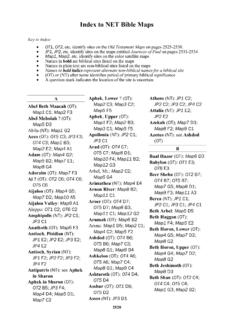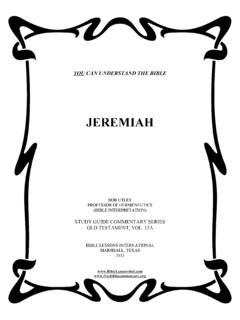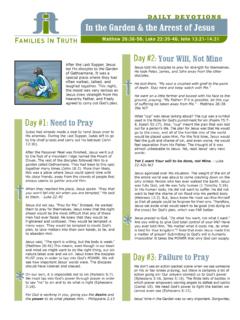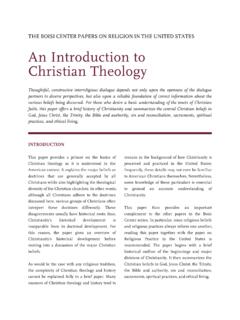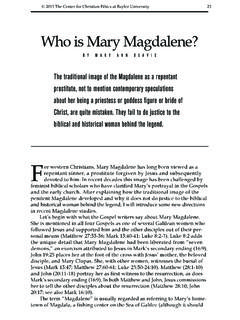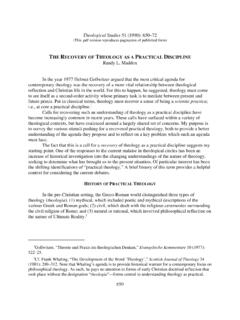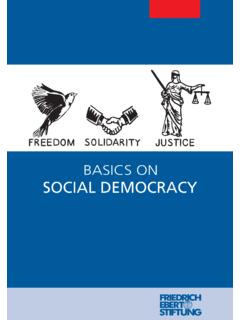Transcription of Introduction to Theology - Bible
1 Introduction to Theology , Fall 2003 1 Introduction to Theology Outline for Prolegomena Session 1: Introduction /What is Theology ? (1) Session 2: What Is Theology ? (2) Session 3: Epistemology (1) Session 4: Epistemology (2) Session 5: Traditions of Theology Session 6: Sources of Theology Outline for Bibliology Session 7: Old Testament Transmission and Canonization Session 8: New Testament Transmission and Canonization Session 9: Inspiration Session 10: Inerrancy Introduction to Theology , Fall 2003 2 Prolegomena Deut 29:29 The secret things belong to the LORD our God, but the things revealed belong to us and to our sons forever, that we may observe all the words of this law. Session 1 & 2: What Is Theology ? Outline I. What Is Theology ? II. Who Is a Theologian? III. Categories of Theology I. What Is Theology ? Write a one or two sentence definition of Theology : Introduction to Theology , Fall 2003 3 II.
2 Who Is a Theologian? Who is a theologian? Anyone who has asked the ultimate questions of life: Why am I here? What is life? What happens after death? What is the difference between right and wrong? Why is there something instead of nothing? The question is not, Who is a theologian? but What kind of theologian am I going to be? Are you going to be a good theologian or a bad theologian? This is a more accurate question because, as one writer put it, not all theologies are equal. -Source unknown Rational discussion respecting the deity. Augustine The science of God, and of the relation between God and the Universe. Strong Thinking about God and expressing those thoughts in some way. Charles Ryrie The study of Science of God. Millard Erickson Introduction to Theology , Fall 2003 4 Folk LayMinisterialProfessionalAcademicFive arenas in which we can do Theology : 1. Folk Theology 2. Lay Theology 3. Ministerial Theology 4.
3 Professional Theology 5. Academic Theology Introduction to Theology , Fall 2003 5I. Folk Theology Na ve Traditionalistic Dogmatic Uninformed and unreflective What are some examples? II. Lay Theology More reflective upon learned theological concepts Likely to formulate a doctrine of essentiality More critical of unfounded traditions More willing to use study tools What are some examples? Introduction to Theology , Fall 2003 6 III. Ministerial Theology Reflection is more sophisticated Educated in theological methodology Uses tools and resources at a more effective level Working knowledge of the languages Ability to openly critique personal Theology against competing models Devotes more time to reflection What are some examples? IV. Professional Theology Didactically purposed toward lay and pastoral theologians Works with pastoral and lay theologians Conducts practical original research Critically evaluates common theological trends and folk Theology Often accused of quenching the Spirit What are some examples?
4 Introduction to Theology , Fall 2003 7V. Academic Theology Overly speculative Overly critical dialogue can come only with other theologians Ivory Tower theologians Unspiritual Theology Follows the academic status quo What are some examples? Theology is for everyone. Indeed, everyone needs to be a theologian. In reality, everyone is a theologian of one sort or another. And therein lies the problem. There is nothing wrong with being an amateur theologian or a professional theologian, but there is everything wrong with being an ignorant or sloppy theologian. -Charles Ryrie Introduction to Theology , Fall 2003 8 How do we do Theology everyday? In other words, how does our Theology influence our daily routine? What Is Theology and Who Is a Theologian? Credo ut intelligam --Anselm of Canterbury Introduction to Theology , Fall 2003 9 III. Categories of Theology A.
5 Systematic 1. Prolegomena: Literally means first word. Deals with the _____ _____ of Theology such as theological methodology, sources, and reasons for the study of Theology . 2. Bibliology: The study of the _____, _____, _____, and _____of Scripture. 3. Theology Proper: The study of God s _____. Sometimes called _____. 4. Christology: The study of the _____ and _____ of Christ. 5. Pneumatology: The study of the person and work of the _____ _____. 6. Anthropology: The study of the nature of _____ both in its pre-fall and post-fall state. 7. Harmartiology: The study of the nature, origin, and effects of _____ on all creation. 8. Angelology: The study of the nature and works of _____ and _____. 9. Soteriology: The study of _____. 10. Ecclesiology: The study of the nature of the _____. Introduction to Theology , Fall 2003 1011. Eschatology: The study of the _____ _____. B. Biblical Biblical Systematic Restricts its study to the Scripture.
6 Examines the parts of Scripture. Compiles information on a doctrine from a specific writer ( , John or Paul) or a particular era ( , Abrahamic, Mosaic, prophetic). Seeks to understand the process as well as the result the product. Seeks truth from Scripture and from any source outside the Bible . Examines the whole of Scripture. Compiles information on a doctrine by correlating all the Scriptures. Seeks to understand the result the product. Relationship of Categories Scripture Biblical Historical Philosophical Systematic Theology Apologetic Theology Creedal/Dogmatic Theology Introduction to Theology , Fall 2003 11 Historical interpretation Grammatical interpretation Literary interpretation Contextual interpretation Exegetical Statement What did it mean then? Theological Statement What timeless truth is being taught? Extract timeless truth principles Homiletical Statement How does it apply to us? Preach it!
7 Introduction to Theology , Fall 2003 12C. Historical D. Creedal/Dogmatic E. Apologetic F. Philosophical Introduction to Theology , Fall 2003 13 Session 3 & 4: Epistemology What is Epistemology? A Conversation Between Protagoras and Socrates (4th Century ) Protagoras: Truth is relative. It is only a matter of opinion. Socrates: You mean that truth is mere subjective opinion? Protagoras: Exactly. What is true for you is true for you, and what is true for me is true for me. Truth is subjective. Socrates: Do you really mean that? That my opinion is true by virtue of its being my opinion? Protagoras: Indeed I do. Socrates: My opinion is: Truth is absolute, not opinion, and that you, Mr. Protagoras, are absolutely in error. Since this is my The branch of philosophy that is concerned with the theory of knowledge. It is an inquiry into the nature and source of knowledge, the bounds of knowledge, and the justification of claims to knowledge.
8 Feinberg The theory or science of the method or grounds of knowledge. WebsterToday evangelical Christians stand at a greater distance from those with whom we communicate than we did just 20 years ago. At that time, even those who rejected Christianity were prepared to discuss whether the evidence for Christianity s truth was adequate. Today, this is much less frequently the case. Before we can broach the question of whether the Christian gospel is true, we have to establish that such a thing as truth exists. Introduction to Theology , Fall 2003 14opinion, then you must grant that it is true according to your philosophy. Protagoras: You are quite correct, Socrates. Epistemology: A historical survey three periods: 1) Premodern (400-1600 ) 2) Modern (1600-1900 ) 3) Postmodern (1960-present) 1. Premodern 2. Modern 3. Postmodern Introduction to Theology , Fall 2003 15 Modernist Objections to Christianity What about all the contradictions?
9 God is just a crutch. Religion was invented by man. Jesus was just a man. The Bible we have today is not the same as when it was written two thousand years ago. I don t believe in what I can t see. Evolution has proven Christianity to be wrong. The Bible is a myth full of fairy tales. How did Noah get all of the animals on the Ark? There are no such thing as miracles. Do you really believe in the story of Adam and Eve? Postmodernist Objections to Christianity If God exists why is there evil? The inquisition and the Crusades show that Christianity is oppressive. Christianity is a way to God but not the only way. Christianity is arrogant and exclusive. How do you know that your Bible is better than other religious writings? Why does God allow bad things to happen to good people? In postmodernism, there is no objective, universal truth; there is only the perspective of the group.. In postmodernism, all viewpoint, all lifestyles, all beliefs and behaviors are regarded as equally valid.
10 Tolerance has become so important that no exception is tolerated. Charles Colson, How Now Shall We Live?, 23 Introduction to Theology , Fall 2003 16 What about those who have never heard? The church is full of hypocrites. Why would God send anyone to Hell? The God of the OT is cruel, partial, and unjust. A. Modern View of Truth Example: True statements are that which _____ to _____ reality. False statements are those that do not _____ to _____ reality. Law of non-contradiction applies A -A at the same time and in the same relationship. Key Motto: Man can know all truth. B. Postmodern View of Truth Correspondence view of truth: (1) Truth is an objective reality that exists whether someone believes it or not, (2) and that objective reality has no definite basis. Introduction to Theology , Fall 2003 17 Example: Law of non-contradiction does not apply A = -A at the same time and in the same relationship.







